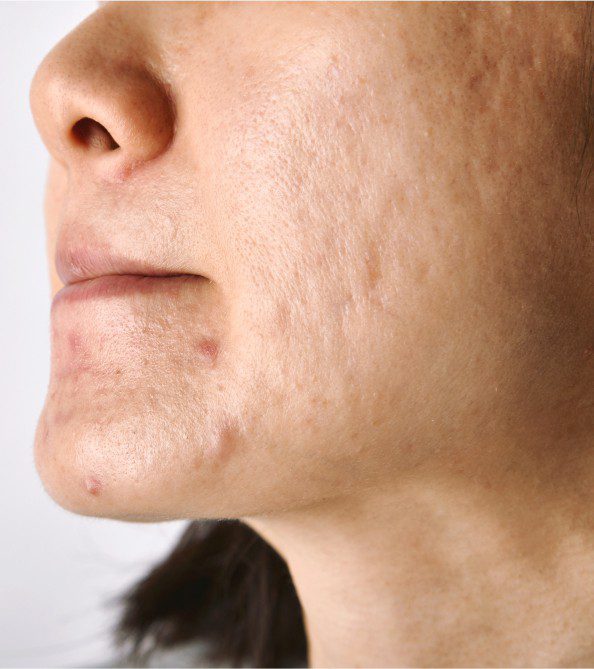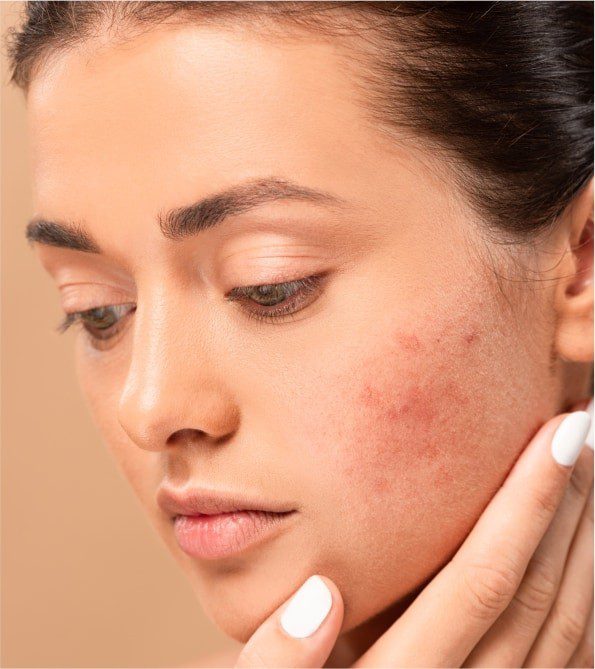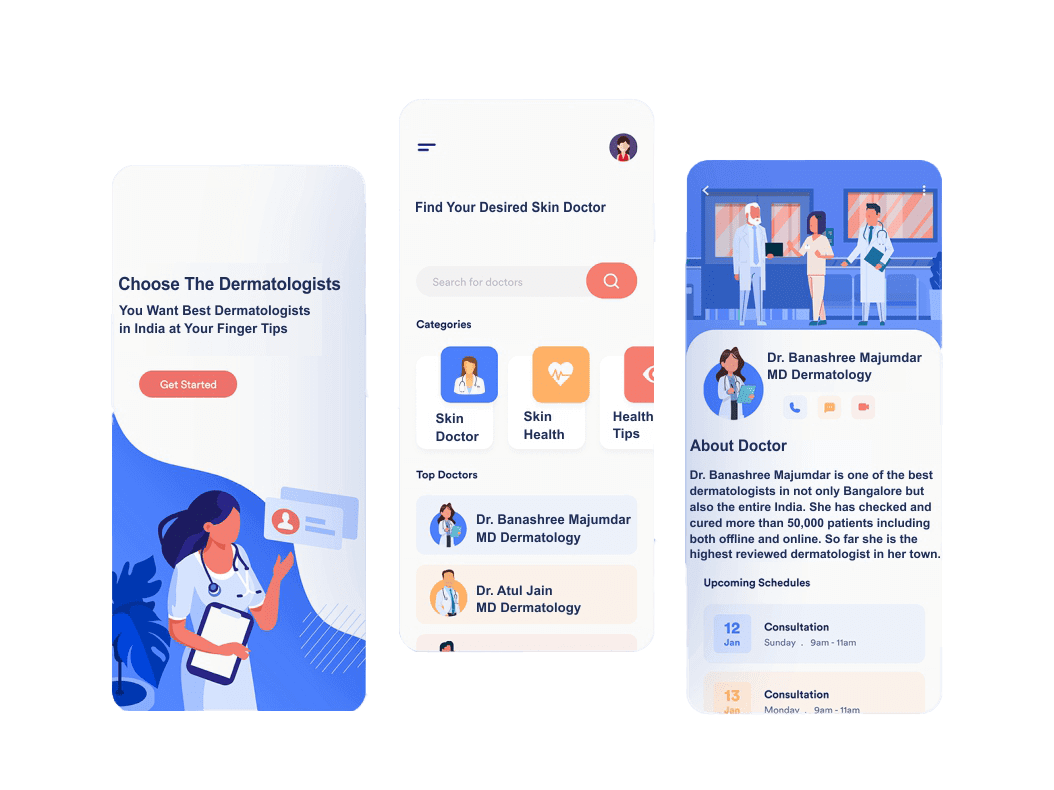Acne Scars - Know About Disease, Treatments, & Cost in Jaipur at Skinaa Clinic
Skinaa Clinic has some highly advanced acne scar treatment in Jaipur
Acne Treatment at Skinaa Clinic
Acne is a common skin condition that affects individuals of all ages, though it is particularly prevalent among teenagers. It manifests as different types of bumps on the skin, including whiteheads, blackheads, and pimples. Acne primarily occurs on the face, forehead, chest, upper back, and shoulders. It’s caused by the clogging of hair follicles with oil and dead skin cells.
At Skinaa Clinic, we understand that acne is more than just a skin condition; it can be a significant source of distress, impacting self-esteem and daily life and our approach focuses on personalized treatments to effectively manage and reduce acne.
What are the types of Acne?
Acne manifests in various forms, each with distinct characteristics:
- Fungal Acne (Pityrosporum Folliculitis): This type of acne is caused by an overgrowth of yeast in hair follicles, leading to itchy and inflamed outbreaks. Unlike typical acne, fungal acne often requires specialized treatment.
- Cystic Acne: One of the more severe forms, cystic acne is characterized by deep, pus-filled pimples and nodules. It’s notorious for its potential to cause scarring due to the depth and inflammation of the breakouts.
- Hormonal Acne: Commonly affecting adults, hormonal acne is triggered by an overproduction of sebum, which leads to clogged pores. It’s often associated with hormonal fluctuations and requires a targeted treatment approach.
- Nodular Acne: A severe variant, nodular acne presents as painful pimples on the skin’s surface and deeper nodular lumps beneath the skin. This type can be particularly distressing due to its visibility and discomfort.
Each type of acne can significantly impact self-esteem, and both cystic and nodular acne carry a higher risk of lasting skin damage, such as scarring. Timely consultation with a healthcare provider is crucial for accurate diagnosis and effective treatment to manage these conditions.
What are the Symptoms of Acne?
Recognizing the signs of acne is crucial for timely treatment. At Skinaa Clinic, we look for:
- Whiteheads (closed plugged pores)
- Blackheads (open plugged pores)
- Small red, tender bumps (papules)
- Pimples (pustules), which are papules with pus at their tips
- Large, solid, painful lumps beneath the surface of the skin (nodules)
- Painful, pus-filled lumps beneath the surface of the skin (cystic lesions)
What are the causes of Acne?
There are many factors that can cause Acne. These factors are:
- Pore Clogging: Acne occurs when pores on the skin become clogged. Each pore is connected to a follicle, containing a hair and an oil gland.
- Role of Oil Glands: The oil from these glands helps in removing dead skin cells and maintaining skin softness.
- Formation of Plugs: Clogging happens due to a mix of oil and skin cells, forming a plug or comedone.
- Whitehead: If the plug’s top is white.
- Blackhead: If the plug’s top is dark.
- Bacterial Infection and Pimples: Bacteria trapped in the plug can cause an immune reaction, leading to pimples.
- Nodulocystic Acne: Deep skin acne can result in painful cysts, known as nodulocystic acne.
- Prevalence: Acne is common in teenagers but can affect all ages, including babies. It often has a genetic component.
What are the Triggers of Acne?
- Hormonal Changes: Related to puberty, menstrual periods, pregnancy, birth control pills, or stress.
- Oily Products: Use of greasy cosmetic and hair products.
- Certain Medications: Steroids, testosterone, estrogen, phenytoin, and some drug-containing IUDs.
- Environmental Factors: Heavy sweating and high humidity.
- Physical Contact: Excessive touching or rubbing of the skin.
Diet and Acne: No conclusive evidence links chocolate, nuts, and greasy foods to acne. However, diets high in refined sugars or dairy may be connected to acne in some individuals, though controversial.
What are the Acne Risk Factors of Acne?
Risk factors for acne include:
- Age: Teenagers are more prone to acne.
- Hormonal changes: Such as during puberty or pregnancy.
- Family history: Genetics play a role in acne development.
- Greasy or oily substances: Contact with oily lotions and creams.
- Stress: Doesn’t cause acne but can worsen it.
Acne Complications
Complications of acne can include:
- Scarring of the skin
- Dark spots on the skin
- Low self-esteem and depression
Acne Prevention
To help prevent acne:
- Wash problem areas with a gentle cleanser
- Use oil-free, water-based skin care products
- Avoid heavy makeup
- Shower after strenuous activities
- Avoid friction or pressure on your skin
Acne Treatment
Treatment for acne focuses on reducing oil production and inflammation, preventing scarring, and minimizing skin damage. Common treatments include:
- Over-the-counter topical treatments
- Prescription topical or oral medications
- Therapies such as chemical peels, extraction of whiteheads and blackheads, and steroid injections
- Laser Treatment
At Skinaa Clinic, we understand the complexity of acne and its impact on individuals. Our expertise in treating various acne types – from fungal to nodular – allows us to provide personalized and effective treatments. We focus on early intervention to prevent complications like scarring and emotional distress. Our treatments range from topical medications to advanced laser therapies, targeting the root causes of acne. Our goal is to enhance skin health and boost our patients’ confidence with customized care and state-of-the-art solutions.


FAQ
What are Do’s and Don’ts if You Get Acne Scars?
Acne scars should be treated when they are in the initial stage. Swollen and serious lesions are harder to treat at home. You shouldn’t squeeze or pop one’s acne as the impurities present in the lesion may be forced deeper by this act. By popping or rubbing your skin aggressively, you may damage the skin.
What are After Care Instructions if I Take Treatment?
You would need to follow some instructions and/or a course of medication prescribed by Skinaa’s doctor. Keeping your face skin safe from sun rays for a suggested number of days should also be followed.
Do Regular Medicines Work in Acne Scars?
Yes, regular medicines might work on the scar if they are mild and not permanent. But if the scar is severe (deep and critical), medical and procedural treatments such as micro needling, dermabase, and laser treatments, it can boost the production of collagen and rebuild the broken tissues.
Rooms
Cured
In India
Practo
Become a Premium Skinaa Member
Apply for a Premium Membership at Skinaa Clinic and Avail Stunning Off on
Consultation Fees, Lots of Free Procedures, Get Preferred Support and Feel
Extraordinarily Exclusive.




